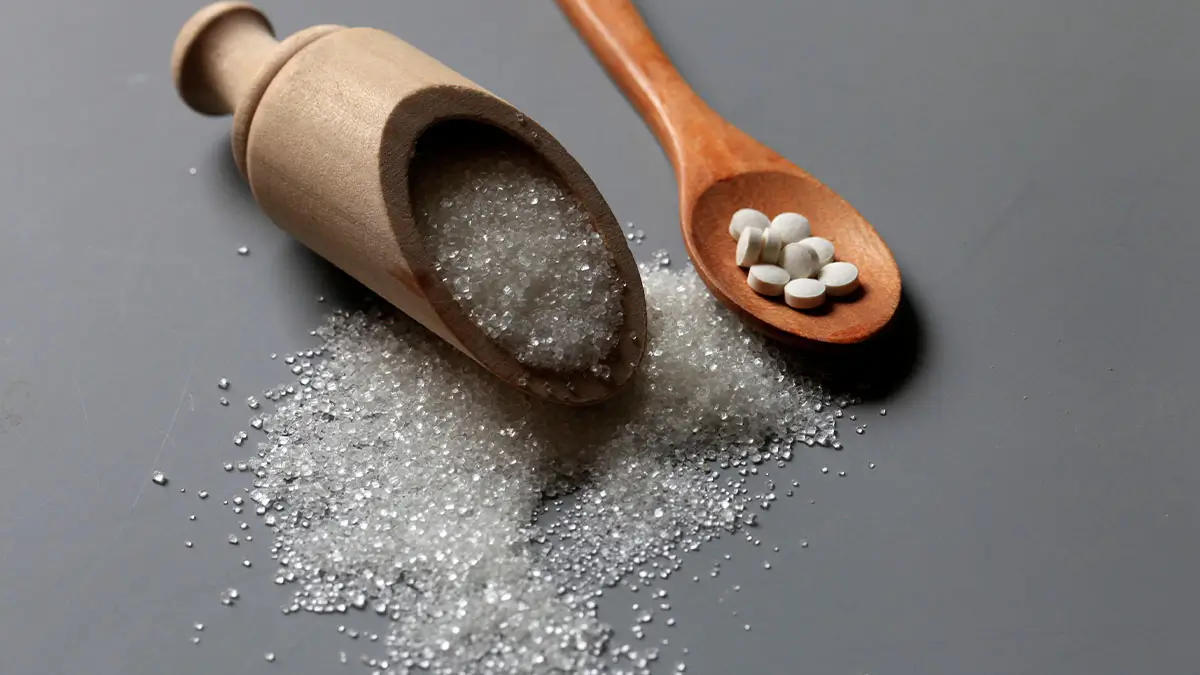A new study is raising concerns about Erythritol, a sweetener widely used as a low-calorie sugar substitute found in “keto-friendly” foods, baked goods and candy. Cleveland Clinic researchers compared erythritol to regular sugar and found that only erythritol caused cardiovascular effects.
Although the study was small, it’s the first comparative analysis of people’s blood levels of sugar after consuming products containing either erythritol or sugar (glucose).
“We compared the results and glucose did not cause any problems,” said Dr. Stanley Hazen, a cardiologist at the Cleveland Clinic and lead author of the study. The study was published Thursday morning in the journal Arteriosclerosis, Thrombosis and Vascular Biology.
Erythritol is one of a growing list of sugar-free sweeteners found in low-calorie and sugar-free foods. Erythritol and xylitol are sugar alcohols that are as sweet as sugar but have far fewer calories. Erythritol is often combined with another sweetener, stevia, and xylitol is often found in chewing gum, mouthwash and toothpaste.
Previous studies from Hazen’s lab — one published last year and the other in June — found a possible link between sugar alcohols and an increased risk of heart attack and stroke. Research has shown that both sugar alcohols can make blood platelets stickier and therefore more likely to clot and cause blockages in veins or arteries, which in turn contributes to heart attack and stroke.
For the new research, Hazen’s team looked at the cardiovascular effects of erythritol and common sugar (in this case, glucose) by enrolling two groups of healthy, middle-aged male and female volunteers: 10 who consumed erythritol and 10 who consumed sugar.
Both groups fasted overnight. In the morning, blood was drawn to measure platelet activity. Then, half of the volunteers drank a glass of water mixed with 30 grams of glucose and the other half drank a glass of water mixed with 30 grams of erythritol. Hazen said 30 grams of erythritol is a common amount for foods sweetened with erythritol.
About 30 minutes after each group consumed the sugary drink, their blood was drawn and tested again. The researchers found that those who consumed erythritol had greater platelet aggregation, meaning their blood was more likely to clot. The adults who regularly drank the sweetened beverage had no change in platelet aggregation.
The researchers measured a 1,000-fold increase in blood erythritol levels in the group that received the erythritol drink. Those who drank the glucose water had no change in blood erythritol levels and their blood glucose levels increased only slightly. This finding caught Hazen’s attention because it was far higher than the trace levels of erythritol found naturally in the blood.
“The amount of it in sugar substitutes is thousands of times greater than what our bodies produce, so it’s not accurate to call it ‘natural,'” he said. “The best recommendation is to avoid sugar substitutes, and sugar alcohols in particular, because the risk of blood clots increases sharply after consuming them.”
The Food and Drug Administration considers artificial sweeteners, including erythritol and xylitol, to be GRAS, or generally recognized as safe. Hazen hopes the growing evidence on sugar alcohols might prompt the FDA to take a closer look at the data.
Outside the U.S., the concerns have piqued the interest of food regulators. Last year, for example, the European Food Safety Authority recommended that the European Commission request data on the amount of erythritol present in foods, which could help clarify the risks.
Do the findings indicate that erythritol is worse than high-calorie sugar overall? A high-sugar diet can lead to increased blood sugar levels, which are also linked to stroke and clot risk, said Valissa Hedrick, a registered dietitian at Virginia Tech. Hedrick was not involved in the Cleveland Clinic study.
The study has several important limitations. Despite the small number of participants, it measured the effects of erythritol and glucose over a single period of time, rather than months or years of continued consumption, Hedrick said.
And the amount of glucose in sugar water (about 30 grams) is equivalent to about 120 calories of sugar. Sugary beverages, especially juices and sodas, have a lot more sugar.
For example, a 12-ounce can of Coca-Cola has 39 grams of sugar, and a 12-ounce can of Mountain Dew has 46 grams.
Michael Goran, MD, a professor of pediatrics at the University of Southern California Keck School of Medicine, said it’s fair to compare erythritol to fructose and glucose. The combination of fructose and glucose is more common in sugary juices and sodas than glucose alone, he said. Goran was not involved in the new study.
Hazen’s study looked only at glucose.
Although the Cleveland Clinic study found no negative effects from sugar intake, the researchers agreed that the data does not mean that sugar is free of harmful effects. Excess sugar may have a similar effect on platelets, especially in people with diabetes, who cannot effectively control high blood sugar.
Hazen’s study focused specifically on healthy people, not those with diabetes.
It may also be important to see whether cardiovascular effects differ when people consume foods containing erythritol compared with water containing erythritol, said Dr. Mitchell Perlman, a gastroenterologist, executive director and co-founder of the Prime Institute in Miami.
“Factors such as protein, fat, fiber and other nutrients may influence this response,” he said.
Ultimately, Virginia Tech’s Hedrick said, the new study underscores the need for more research to compare the health effects of sweeteners versus sugar.
Hazen and his colleagues concluded the research by urging more studies focusing on erythritol’s cardiovascular risks, especially in people who already have a high risk of stroke and clots.
